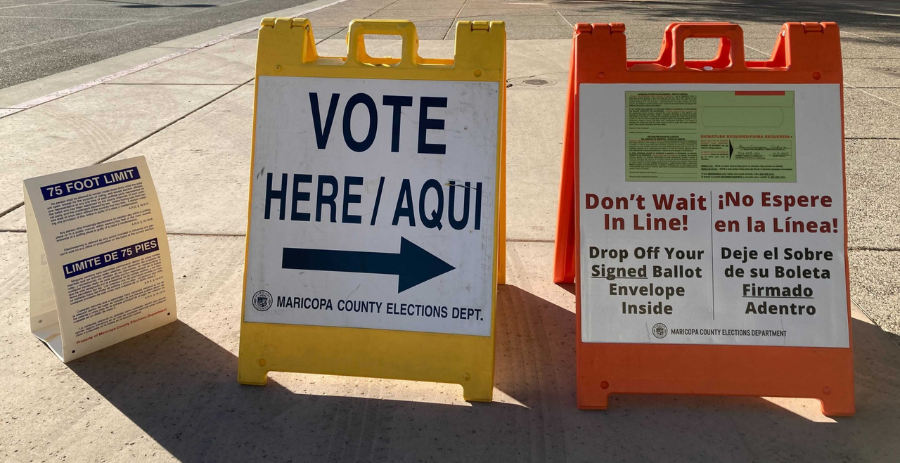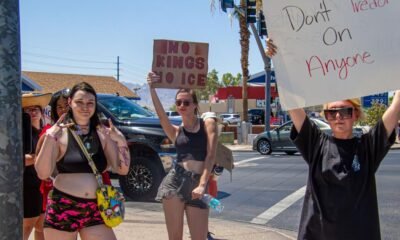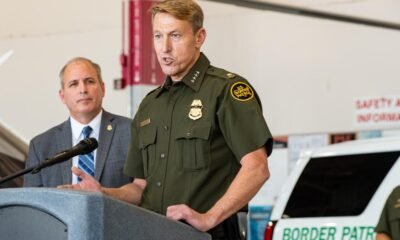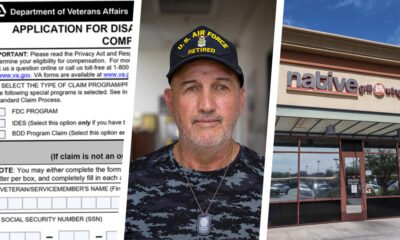arizona
Trump’s SAVE Act Sparks Debate on Noncitizen Voting Claims, Experts Call It Uncommon

WASHINGTON – The prospect of a government shutdown has spotlighted noncitizen voting, a contentious issue in Arizona, as House Speaker Mike Johnson linked the funding package to an election integrity bill. This bill, the Safeguard American Voter Eligibility (SAVE) Act, backed by former President Donald Trump and four Arizona House representatives, mandates proof of citizenship for voter registration in federal elections.
While Congress ultimately passed a spending package devoid of the SAVE Act, its initial inclusion underscores the traction that voter-fraud claims have garnered this election cycle. In Arizona, where President Joe Biden won by a mere 10,000 votes in 2020, noncitizen voting has long stirred political debate.
Republicans in the state have sought to diminish noncitizen voting, despite numerous studies indicating its rarity. Arizona voters approved a 2004 ballot initiative requiring proof of citizenship for full ballot access, affecting participation in federal, state, and local elections. Lacking such proof, voters must swear under penalty of perjury that they are citizens to receive a federal-only ballot.
A notable instance of this issue arose when a database error threatened to disenfranchise approximately 98,000 voters—predominantly registered Republicans—from local and state elections. This figure later soared to 218,000, prompting the Arizona GOP to join forces with Democratic Secretary of State Adrian Fontes in advocating for these voters’ rights.
“Nearly 100,000 Arizona voters should not be penalized for a mistake made by the government,” remarked Republican Party Chair Gina Swoboda in a September 18 release. Following further updates on the affected voter count, the state Supreme Court ultimately ruled in favor of maintaining full ballot access.
This issue resurfaced when Fontes announced that the number of voters with unconfirmed citizenship had exceeded 200,000, leading to a rift with the GOP as Swoboda accused Fontes of being insufficiently transparent.
Political science expert Ron Hayduk argues that claims surrounding noncitizen voting are often used to galvanize right-wing support while simultaneously disenfranchising others. He highlighted the efforts of organizations like the Only Citizens Vote Coalition, which backs the SAVE Act and promotes an anti-immigrant agenda tied to the narrative that Democrats are enabling fraud.
“It continues to perpetuate the myth of vote fraud, positioning it as a solution,” Hayduk asserted, criticizing the portrayal of immigrants as threats to election integrity.
Research indicates that incidences of noncitizen voting are negligible. A 2017 study by the Brennan Center for Justice found that improper noncitizen ballots accounted for just 0.0001% of total votes in 42 jurisdictions during the 2016 presidential election. Furthermore, the libertarian Cato Institute characterized widespread claims of noncitizen voting as unfounded and exaggerated.
Despite the evidence, Trump has continued to assert that Democrats are facilitating illegal voting by noncitizens, even compelling Republicans to pass the SAVE Act to avoid government shutdowns.
During a recent presidential debate, Trump stated, “Our elections are bad…and a lot of these illegal immigrants coming in, they’re trying to get them to vote,” furthering the agenda against noncitizen participation.
Although the consensus among researchers is that noncitizen voting is rare, a 2014 study by Jesse Richman and colleagues, which Trump previously cited, caused controversy over its methodology. Richman cautioned against using the findings to justify an exaggerated fear of disenfranchisement.
“I disagree with those claiming there’s no evidence of noncitizen voting, but I also contest the notion that it’s the significant threat Republicans suggest,” Richman noted.
Critics like Hayduk argue that Republican leaders continue to exploit this study in efforts to propagate false narratives surrounding voter fraud. He remarked, “It’s perplexing that these debunked studies maintain relevance in political discourse.”
The SAVE Act, while advancing in the U.S. House, faces opposition for creating unnecessary obstacles for voters. ACLU Arizona policy strategist Katelynn Contreras stated that registration processes already require proof of citizenship through established identification methods, arguing that placing additional burdens on individuals is impractical.
These barriers disproportionately impact marginalized groups, including students, Native Americans, low-income individuals, and people of color. “The discourse related to voter fraud exacerbates racial tensions and subjects minorities to scrutiny,” asserted Monica Sandschafer, Arizona director for Mi Familia Vota.
The organization, along with others advocating for civil rights, has contested two Arizona laws that impose stringent requirements for proving citizenship and voting rights. While some provisions have been overturned, legal battles remain active.


















